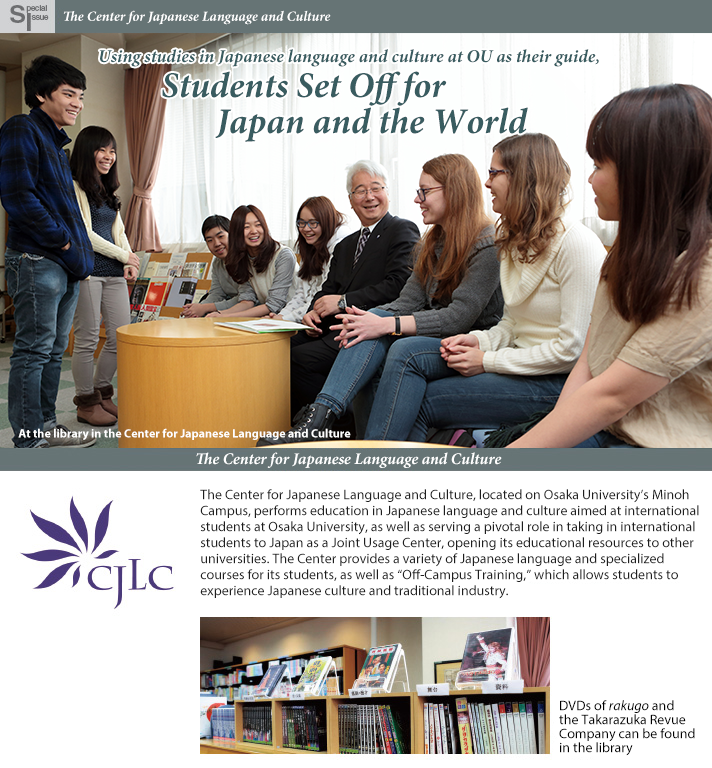
Using Studies in Japanese Language and Culture at OU as their Guide, Students Set Off for Japan and the World

The Center for Japanese Language and Culture was established in 1954 at the Osaka University of Foreign Studies as a special course for international students, and over a half-century later, it plays a part in accepting international students to Japan.
Currently at the Center, there are 190 students, including students on a Japanese government scholarship, who major in Japanese language and Japanese culture. Prof. IWAI Yasuo, director of the Center, said “We offer detailed instruction tailored to the various topics in Japanese language and culture that the students study.”
“There are even students who, while they did not have a basic understanding of Japanese when they first arrived in Japan, became popular with Japanese students around them while relating with them and made remarkable achievements in Japanese language acquisition. Those students with strong communication ability will improve in language ability as well. Even if one’s language ability is a bit lacking, the desire to connect with others is important.”
Additionally, as a “Joint Usage Center for Education in the Japanese Language and Japanese Culture certified by MEXT,” the Center performs joint Japanese language education with other universities.
One of these endeavors is “Off-Campus Training,” in which students visit sites of traditional Japanese culture and local industry, with the Center taking in students from other universities.
This includes a variety of fields, from factory tours in which students learn about the sake brewing process, to making Tamba pottery, to watching sumo wrestling.
In “Off-Campus Training,” which takes place in the spring and fall, students form the Center mix with students from other universities on a 2-day, 1-night trip, in which they experience Japanese culture by staying at a ryokan , or Japanese-style hotel. It’s popular with international students, who have made comments such as, “This was my first time staying at a ryokan ,” and “The hot springs were great, too.” It’s also a place for exchange between students from different universities and different countries.

Over 200 students joined the spring 2015 trip to Fukui prefecture, in which they visited places such as the Tojimbo cliffs and Eihei-ji temple. As the scale of the trips grow, finding new places to visit and ryokan with enough space for all participants to gather for food, etc., becomes a challenge. Director Iwai said, “I want to increase the numbers of smaller trips as well, like visits to local businesses. If we can make effective use of the resources of other universities, it will broaden our options.”
The students at the Center spend a year in Japan and organize what they’ve acquired into a thesis or report, which is then submitted to their instructors at their home universities. Director Iwai mentioned,” Another one of the goals for this Center is to tell the world about Japan through our students.” As for the Japanese students, “I want them to make use of the advantage of being on the same campus as these students and break down any reservations they may have in order to positively interact with the international students.”

International Student Interviews
I want to gain first-hand experience of Japanese culture
and serve as a bridge between Japan and Vietnam in the future
Do Thu Trang (Vietnam)
I’ve been studying the Japanese language since I was in junior high school, so I have an interest in Japanese history and the minds of the Japanese people. I was surprised at the mutual concessions made by the people of Japan during the East Japan earthquake.
Now I’m studying the economic recovery of Japan following World War II. I want to use this time in Japan to really think about how my country can achieve economic development like Japan did.
When I traveled to Tokyo and other places, I was surprised at the differences in language and ways of thinking between Tokyo in the Kanto region and Osaka in the Kansai region.
For example, since people from Tokyo and Osaka stand on different sides of escalators, I was a bit confused. And since I’m so used to the dialect in Kansai, I had difficulty understanding the tax drivers in Tokyo. In the future, I’d like to also visit Hokkaido and learn about Japan’s sightseeing services.
During Off-Campus Training, we visited Himeji Castle, and I was able to really immerse myself in Japanese culture not only from Japanese, but also from Japanese architecture. It was a very valuable experience.
In the future, I’d like to work in a position that connects Vietnam and Japan together to promote friendship between the two nations.
I want to learn more about Japan!My dream is to write a novel in Japanese
Marina Pandolfino (France)
When I was a high school student I became interested in
Japanese language and culture and began studying them.
I think it’s interesting that in Japan, there are various ways of writing, such as hiragana, katakana, and kanji. But Kanji and honorific language are difficult.
Now I’m studying the government and international relations of Japan, and when I return to France, I want to learn even more about Japanese international relations in graduate school.
The cultures of France and Japan are completely different. When people line up to board a train in Japan, they stand in a line, but in France, they’re scattered all over. I think it’s great. There are a lot of things that we can learn from Japan, such as proper manners.
In our Off-Campus Training trip to “Bizen Osafune Japanese Sword Museum,” I was able to actually see how to make Japanese swords, so it was very fun. I spoke with other students from France who were studying at other universities, and I was able to exchange information about classes.
I want to study more about Japan and the Japanese language. Even though it ' s outside of my field of international relations, I’d like to write a novel in Japanese in the future.